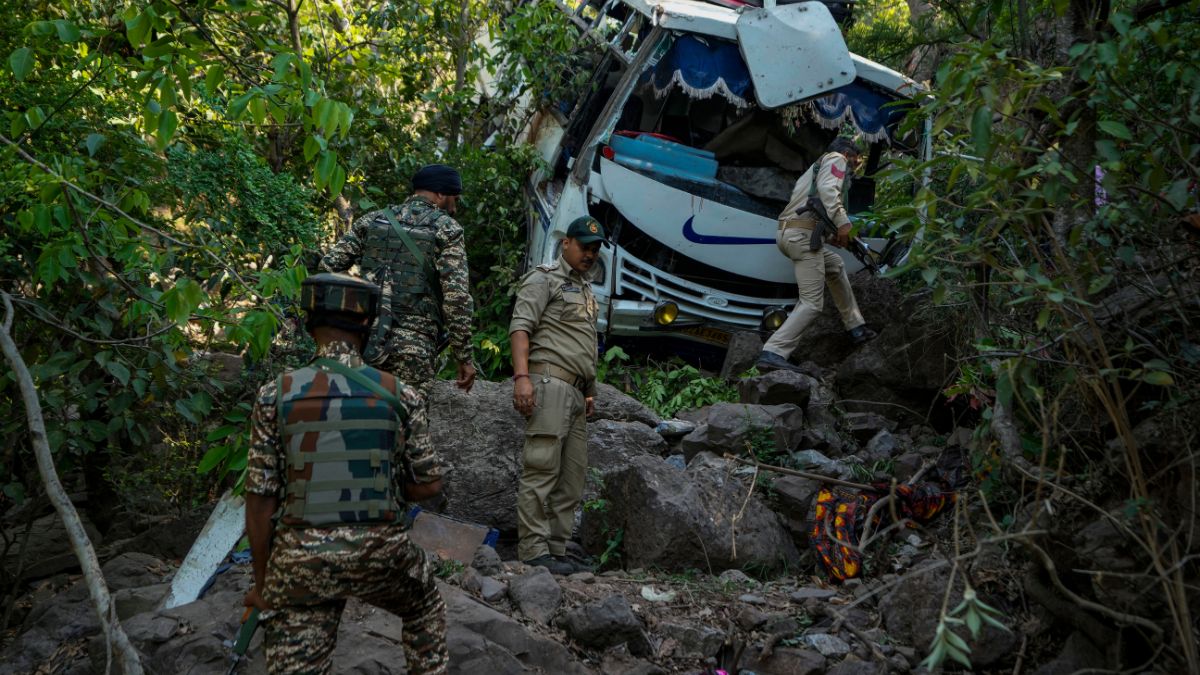The recent terror attacks in Jammu and Kashmir, along with the D8 nations’—Bangladesh, Egypt, Indonesia, Iran, Malaysia, Nigeria, Pakistan, and Turkey—open support to Islamist groups such as Hamas, indicate how these two parallel incidents converge at the point of a common agenda: global jihad. India must get its act together on internal security and adopt an “inward first” approach to protect itself against this danger.
The three terror attacks in J&K serve as a stark reminder that the country’s fight against terrorism is not over. Such earlier incidents too revealed that despite best efforts, peace remains fragile in Kashmir, owing largely to Pakistan’s dubious role in patronising and promoting terrorism in the Valley.
The Reasi attack on Sunday (the first of the three attacks) saw terrorists targeting a civilian bus, resulting in its fall into a gorge. According to Mohita Sharma, SSP Reasi, the terrorists struck the bus full of Hindu pilgrims, due to which the driver lost control and skidded off the road. This attack led to the death of at least 10 civilians, with many more injured. Initial investigations point towards the involvement of Pakistan in this attack.
The recent developments in West Asia, especially with Israel taking a tough stand on Hamas, have given a fresh impetus to Islamist elements in the region and beyond. This is not a good development for India and its security.
Pakistan continues to remain the main base of anti-India forces in the region. By promoting cross-border terrorism, it nurtures terror through the ISI and supports terror outfits like Lashkar-e-Taiba and Jaish-e-Mohammed. To make matters worse, it has spread its wings in other countries such as Bangladesh and Nepal to spread anti-India nefarious activities.
The internal situation in Bangladesh too is fluid. Despite strong historical ties, including India’s support during Bangladesh’s liberation war against the tyrannical Pakistan and, in recent times, considerable Indian investments in Bangladesh’s infrastructure, growing anti-India sentiment has entered quotidian discourse in that country. Though at the federal level relations remain amicable, they are still fragile at the people-to-people level. According to the Voice of Khorasan magazine, which is the mouthpiece for ISIS-K, the establishment of a caliphate in Bangladesh is openly espoused. This kind of extremist propaganda has influenced the boycott of Indian goods in Dhaka in recent times.
Impact Shorts
More ShortsIn the Maldives, despite New Delhi’s endeavours to foster friendly ties through numerous development schemes, certain political factions with radical views tend to spread anti-Indian propaganda. These sentiments, which are mostly ignited by hard-core Islamist elements, disrupt peace in South Asia, thus making it difficult for India to have good relationships with its neighbours.
Then, of course, there’s Turkey, which has been openly pushing an anti-India foreign policy. This encompasses contesting the Indian stand on Jammu & Kashmir and showing support to Pakistan over the matter.
Way Ahead for India
India should strengthen its ‘Neighbourhood-First’ policy by re-evaluating strategies employed therein, engaging with leaders at regional levels through talks, among other methods, and stepping up diplomacy too. At the heart of this policy lies its strong partnership with Bangladesh, which is personified in the bonhomie between Prime Minister Narendra Modi and his Bangladeshi counterpart, Sheikh Hasina. High-level interactions give good momentum, but the real progress depends on the connectivity at the grassroots level. Bipartisan support for the relationship demands engagement not only at the political level but also at the level of the people.
At home, de-radicalisation measures must be undertaken by India to target the root causes of extremism. Inclusive programmes should be implemented to help disengage from radical ideologies, rehabilitate, and then reintegrate affected individuals. Capacity development should also be encouraged in formal education, and facilities for running educational institutions by unorganised religious elements should be closed to shut the door on further radical recruitment.
Countering extremism needs a unified approach that involves, among other things, joint military training with neighbouring nations on counter-terrorism measures, cultural exchange programmes with them, sharing best practices, and fostering people-to-people contacts. Effective global alliances are necessary for cutting off support systems for violent non-state actors at different levels, such as United Nations Security Council resolutions and G20 pronouncements, among others, while engaging across regions through mechanisms like the ASEAN Regional Forum (ARF).
India should actively engage itself regionally through such forums as Bay of Bengal Initiative for Multi-Sectoral Technical and Economic Cooperation (BIMSTEC) so that collective security arrangements can work well within regions. By doing this, India can help Bangladesh, among other neighbouring countries, solve mutual problems, which can then lead to stability and mutual trust.
Given that international and national security are at risk due to the confluence of terror networks globally, there is no room for complacency. The recent attacks in Kashmir are a reminder that India cannot go easy on terrorism, which continues to remain global scourge.
The author is a Research Fellow, IFC-IOR, India. The views expressed in the above piece are personal and solely those of the author. They do not necessarily reflect Firstpost’s views.
)